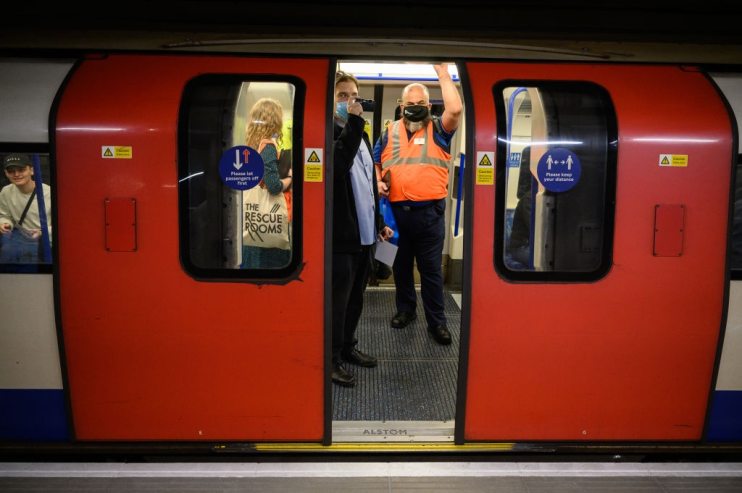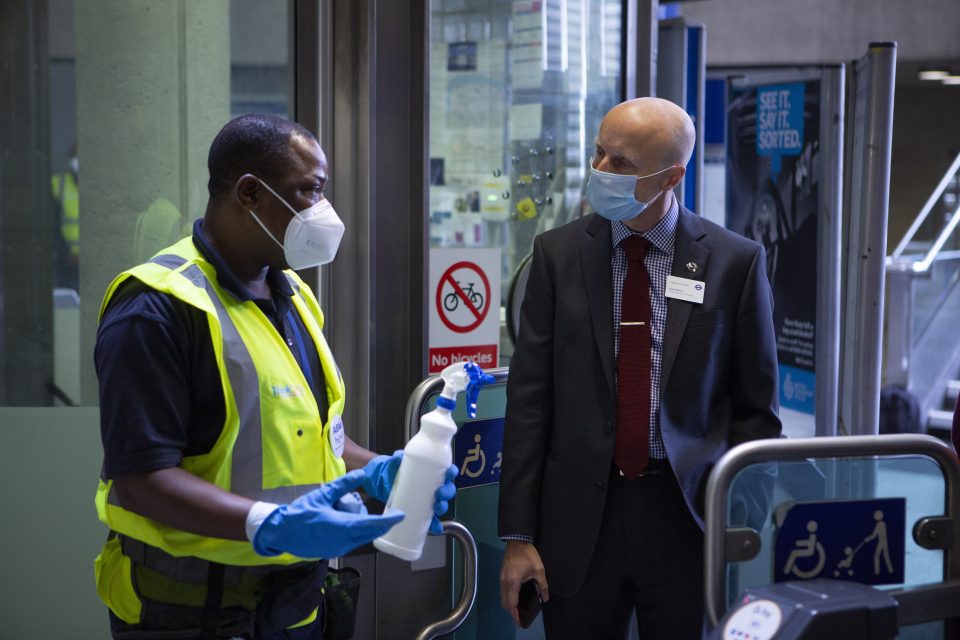Mind the funding gap: Can the TfL boss secure London’s Tube network’s future?

It’s only September, but one date is very much etched in the mind of Transport for London (TfL) Commissioner Andy Byford: 11 December.
That’s when TfL’s latest £1bn funding package runs out, the third short-term deal the government has bestowed on the capital’s transport network, despite repeated pleas for a multi-year settlement instead.
And although the negotiations between City Hall and Whitehall have at times devolved into unseemly squabbling over the last 18 months, Byford, who took the top job in June 2020 amid the worst travel downturn in history, is adamant that this time the outcome will be different.
“There is common ground. Everyone agrees that TfL needs to thrive – you can’t have a capital city without a viable transport system”, he tells City A.M..
And more to the point, he adds, there can be no full national recovery from Covid-19 without London – so agreeing a long-term deal for TfL is more than just an issue for the capital.
“We’ve got to come to an arrangement with the government that secures TFL’s long term funding future: it’s existential.
“But it is in the government’s interest because [it] has set out three primary objectives for the UK, all of which we are saying we can be good partners in.
“One: the government wants to see an infrastructure-led recovery from the pandemic. Well, we have plenty of viable projects.
“Two: the government wants to decarbonize the UK by 2050, and it won’t do that if we don’t decarbonise the UK’s biggest bus fleet.
“And doing that tackles the third objective, which is levelling up. We spend 55p of every £1 outside of London. We buy our buses in places like Ballymena and Falkirk. British companies would be able to set up a viable production line for electric vehicles, but they’ll only do that with volume and London has that volume.”
“Don’t forget that London generates £39bn net for the Exchequer every year, so you’ve got to get London firing again in order to achieve levelling up, and in order for London to motor, TfL has to be properly funded.”
And although he insists he is “grateful” for the £4bn that TfL has received since the pandemic put paid to its revenues last spring, he maintains that the hand-to-mouth approach cannot continue.
“Short-term deals are inherently inefficient”, Byford explains. “They mean that we are not able to leverage better efficiencies from our contractors because we can’t give certainty to contractors because they don’t know how much we’ll be able to commit in the long term.”
He puts it in the starkest possible terms. “It will be a betrayal for London, if we were then only given a short term or sub-optimal deal either in terms of quantum or duration.”

Service cuts a ‘death spiral’
As a result of the government’s deals, TfL has secured £1.4bn of the £1.9bn it has said it will need for the current financial year, but if it doesn’t secure the final £500m by the end of the year the network will run out of cash.
The Department for Transport (DfT) set the operator the task of coming up with new ways to raise the money on its own, but has thus far batted back both of TfL’s suggestions – a new boundary charge on non-London registered cars entering the capital or allowing London to keep its share of Vehicle Excise Duty (VED).
Here Byford, who became known as “Train Daddy” after a successful spell running New York’s transit system, shows some signs of frustration with the government.
“We have to break this impasse there, but work with me”, he says. “You can’t keep saying no, we can’t stick our heads in the sand because there is still a £500m gap, but if we can fill that gap, then we can get back to being financially self sufficient… by 2023.”
For Byford, that means covering day to day operations, maintenance and cost of capital costs, all a year ahead of TfL’s previous target.
Given that the pandemic cut 95 per cent of the network’s revenue in one fell swoop, Byford admits that getting to that point would be a “remarkable achievement”.
But one thing that is not on the table is cuts to TfL’s services.
“It’s a death spiral”, he says. “It would be false economy and folly to cut services or maintenance now before we know what the recovery will look like. That is a slippery slope that’s easy to do and you regret it at your leisure.”
However, he did not rule out “tweaks” to services, like cutting the frequency of buses on central London routes, as TfL has already done.
For the time being, though, it does mean that huge new infrastructure projects like Crossrail 2 or the Bakerloo Line extension will remain on the shelf.
Asked when they could be given the green light, Byford demurs, saying he doesn’t have a “crystal ball”, but insisting they remain viable schemes with compelling business cases.
“For now we have to rein in our ambitions, and that we should focus instead on finishing off the jobs we’ve already got.”
Crossrail opening is question of ‘personal reputation’
With all this on his plate, it is easy to forget – momentarily – about Byford’s other huge challenge – finally opening the much-delayed, oft-maligned Elizabeth Line.
But he is again absolutely adamant that his team will have Crossrail open within the first half of 2022, without recourse to more than the £18.9bn that has been budgeted.
Given that this will still make the rail link three and a half years late and £4bn more than was initially expected, Londoners could be forgiven for raising their eyebrows at such a pledge.
Byford says he understands the “reputational risk” that his commitment represents, but says he is “leaving nothing to chance”.
“This isn’t a case of crossing fingers and hoping we hit that deadline. We are micromanaging that [project] across the line and so I have said, and I will repeat, there will be no further slippage beyond that which we inherited from the Crossrail board.”
In order to make sure the target is hit, TfL has, at Byford’s direction, brought in two “world experts” on station design and programme management.
For some, just getting the first section – from Paddington to Abbey Wood – open would be achievement enough.
But Byford is nothing if not ambitious. “We’re aiming as close to opening half of that [six-month] window as possible.”
After so turbulent a year and a half, opening the Elizabeth line would, for many of the capital’s cheerleaders, be a clear statement of that London remains the powerhouse it has been for so long.
“There are some doom and gloom merchants out there who say that’s it London is never going to get back to what it once was. I don’t believe that. I think London is a very resilient city, it’s bounced back from all sorts of challenges in the past”, Byford says.
Again, if he can get a deal by the end of this year, it will be yet another sign that London has its swagger back. He’ll be hoping Christmas comes early – if only by 14 days.